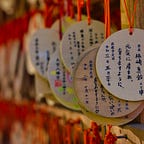Post #2
Hello everybody. We are finally here at the end of the quarter! Honestly, this quarter flew throw so fast that it still feels surreal to me. Anyway, for this post, we have to go back to where we started, the first reading that set off this course; “Letter on a Plague Year” by Cooke.
When I read this article for the first time, I felt the importance of community during a pandemic. Being the only major worldwide pandemic in decades, Covid had caused a great amount of civil unrest. Within such time, a community of people could provide mutual aid to support each other. After learning about the history of Zainichi Koreans and other moments in Japan, I realized there is a similarity between the two. The communities that formed during Covid are no different than the ones we see in the readings. Like the communities formed by the Zainichi Koreans seen in Kang’s memoir, the people with very little power living in an oppressive environment provide mutual aid to each other to survive. Also not forget about the connection between student activists and the unionists, as their collaboration demonstrates how a shared goal can bring people together.
In my opinion, some additional conversation needed at the moment would be on how to preserve these types of communities, or if preserving them is important. As such communities are formed with a common benefit to everyone involved, what would happen if that common goal disappeared? As the world is recovering from covid slowly, the need for mutual aid is slowly dissipating. Is it fine to just let the communities disappear and let them form again when a new need appears? Or should people try to retain such relationships with each other?
Lastly, I would like to thank professor Matsumura for this amazing quarter. This is my 3rd course taken with you, and it is also my last one. You are amazing and I love the topics you bring to the class. You made my college experience more wonderful and fuller than it would’ve been. Thank you!
